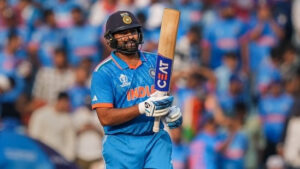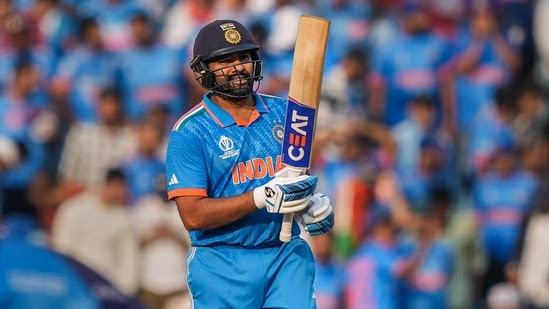
Eighty-seven. It’s not the figure Rohit Sharma will be remembered for in ODIs. He is a man of bigger deeds, some towering ones, as is well-known. He is the world record holder in this format, with an innings of 264. His three double-centuries are more than anyone else. And of course, when it comes to the World Cup, he has the most hundreds in the history of this competition.
When we look back and take stock of things in a few weeks from now or later, the chances are high that this innings of 87 against England in Lucknow will be talked about. Even Rohit might reflect on this effort of his with a bit of fondness and rate it among his more satisfying ones. Not because it came in a big match in a big event. This was an innings where he redefined himself.
Rohit is someone immediately associated with one rare gift when it comes to batsmanship. It’s his timing of the ball and his ability to ‘see the ball early and hit it late’, to quote a famous author. He anticipates a fraction of a second earlier where the ball is going to land. Therefore, his reaction is quicker and the action languid.
This pitch in Lucknow challenged him to show that he could be someone else. The easy-on-the-eye, pleasing type of batting was not going to work on a dry surface where the ball was stopping. For a batter who feeds on even bounce and pace, he had to devise a different method. And it meant that he had to bat unlike himself, mentally far away from the expectations of a madding crowd.
The situation demanded that he take on the role of a soldier, bereft of art. There was no room for niceties. It had to be dead serious and hard grafting. Leave the ball that you love putting bat to. Don’t go for it until it’s very inviting. Even let go some inviting ones, which you normally put away with minimal visible physical effort. Look inelegant, cop a few on the body if need be.
It was not easy, as the collective performance of all the other batters from both sides corroborates. Suryakumar Yadav was the only one out of 22 who came remotely close. India had been scoring at above 6.5 an over in the power play before this match. Rohit was single-handedly responsible for that. Pitch it up, or short, or anywhere in between, and he had a riposte for everything.
In Lucknow, he had to deploy other tricks. He had to change his thought process and resort to different tools. Batting like he would in a Test match is not an appropriate description. The strike-rate was above 86. He hit 10 fours and three sixes off 110 balls. This was ODI batting at its calculated and measured best. He adapted to the conditions better and showed the smartness to tailor his game to a requirement that was different.
There are good players and there are those who get better, with age, experience, snubs and what not. Not being part of a home World Cup in 2011 is a regret that Rohit will carry forever. Seven centuries in the subsequent editions is something the world will remember. Along with those, this innings of 87 should rank high in his list of achievements. He blossomed late, played the ball late and when the time came, showed that he could operate in many gears.




